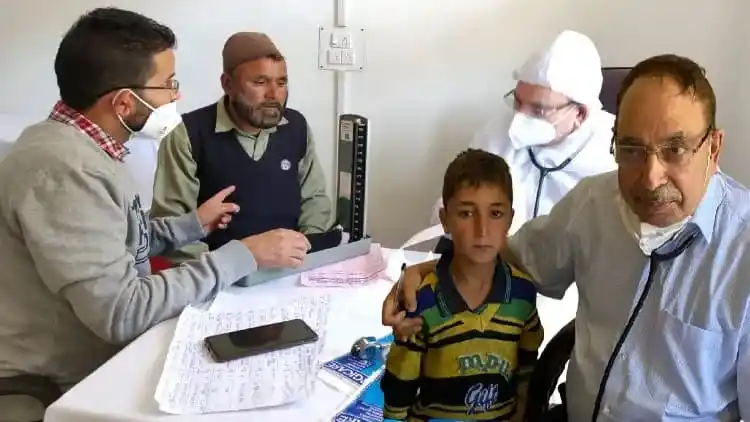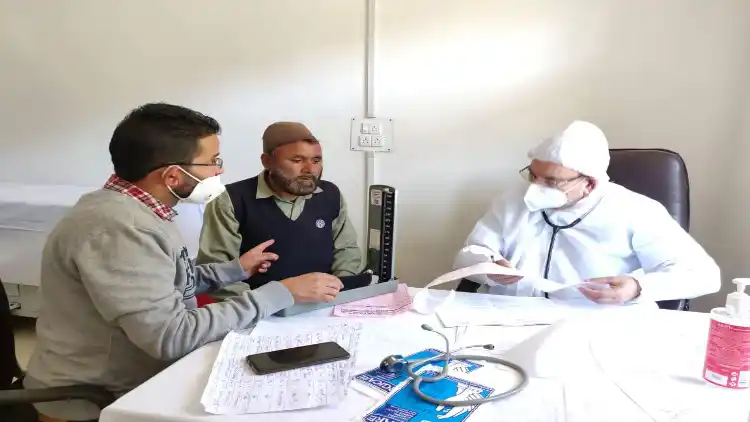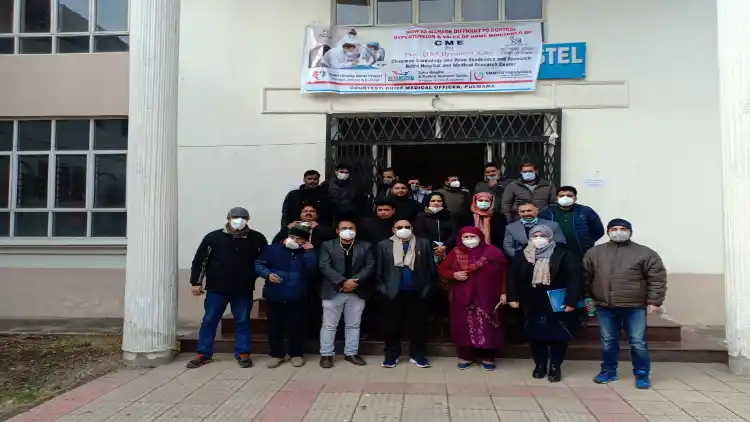Ehsan Fazili/Srinagar
For the past year, Gauri Healthy Heart Project (GHPP) has been organising free camps across nine of the 20 districts of Jammu and Kashmir – most of them in the Kashmir Valley – to make people aware of the risks of heart diseases, their prevention, and treatments.
This mission is launched by the son of the soil Dr Upendra Kaul, who has spent most of his professional life outside J&K, mainly in AIIMS, Delhi, PGI, Chandigarh, and is presently Chairman and Dean Academic and Research at the Batra Hospital and Medical Research center, New Delhi. A well-known cardiologist of India, Dr Kaul has since dedicated himself to mending the hearts of Kashmiris.
“My heart continued to be in Kashmir…. I would spend summer months in the valley during which I developed a friendship with students of Medical College in Srinagar,” Kaul told Awaz-the voice in an exclusive interview.
“I was missing something in my blood and soul,” he said while launching the campaign “No heart attacks by 2025” aimed at bringing down the rising heart attacks in Kashmir to half in 10-15 years.
Dr Upendra Kaul with patients in Kashmir
His mission is in memory of his late mother, Gauri Kaul. “My mother had also the same feelings; she wanted to have our place and live in Kashmir,” he said.
Kaul’s family hails from Hawal village in Pulwama, South Kashmir, and had shifted to Delhi when he was a child. The situation changed in the early 1990 (rise of militancy) and “everything collapsed” and the people suffered for want of medical facilities, Dr Kaul said.
He said while being in different positions in Delhi’s premier hospitals, he would go out of his way to help patients from Kashmir. “I would ensure that these patients do not have to wait for treatment,” he said.
The GHPP has opened an office in Channapora, an uptown Srinagar middle-class locality and it was inaugurated on April 9, the eve of Gauri Kaul’s birth anniversary.
Dr U Kaul has been visiting two private hospitals in Srinagar to see patients for five years. He says it was important for him to start GHPP to reach out to the people in far-flung areas.
Five years ago he bought a house in Srinagar on the Airport road. “I mostly reside here,” he said and occasionally visits Delhi to look after his aged father.
In the camps, Dr Kaul said, “We focus on heart problems, high blood pressure, and diabetes of the selected patients, who are already undergoing treatment.” He felt the ailments were “poorly controlled.”
He said more young persons were suffering from heart ailments due to lifestyle problems and stress. “Besides, the youth in “major towns of the valley have the problem of drug addiction that needs to be checked,” he commented.
His organization has also set up camps at Kupwara, Machil (near LoC), Krimshore and Ringzabal in Budgam, Rajpora in Pulwama, Mir Behri, Leper Colony and Bahrar in Srinagar in Kashmir valley and Banihal town of Ramban district (Jammu division), and Jagti, a camp for displaced Kashmiri Pandits in Jammu.
Dr Upendra kaul with his team in Srinagar
“We also ventured to visit Kakching near Imphal, Manipur in response to an invitation”, he said. A free heart camp is being held in Mumbai, Maharashtra, but the main focus is on Kashmir valley”, he added.
The GHHP is launching its first telecardiology unit in Machil area of Kupwara district in collaboration with the Army on October 15, with the support of the Indian Oil Corporation.
A unit at Jagti migrant camp, housing 20,000 KPs, will be set up soon. A multi-specialty center is also coming up by mid-November Kaul’s ancestral village of Hawal.
“We are more focused on Kashmir,” Dr Kaul said. People in the valley are more “health-conscious,” he said and added that people do come to him in large numbers because of the rapport he has with his patients.”
Kaul says he has received “tremendous support from the Directorate of Health Services,” IMHANS, Kashmir, JLNM Hospital, and other governmental and non-governmental organizations of UT.



